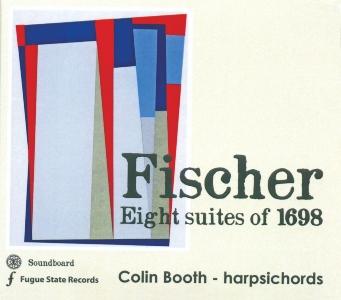A member of The Diapason’s 20 Under 30 Class of 2021, Curtis Pavey is a graduate of the doctoral program at the University of Cincinnati where he studied harpsichord under Michael Unger and piano under James Tocco. In fall 2023, he will be the assistant professor of piano pedagogy and performance at the University of Missouri. More information is available at curtispavey.com.

Fischer: Eight Suites of 1698, Colin Booth - harpsichords. Soundboard, SBCD-222, $16.98. Available from ravencd.com and colinbooth.co.uk.
Harpsichordist Colin Booth’s latest recording focuses on the music of German composer Johann Caspar Ferdinand Fischer’s (1656–1746) suites from 1698 published as Musikalisches Blumen-Büschlein. The recording, finished in August 2021, appears to be the only available complete recording of this collection, offering listeners an excellent opportunity to hear this music in its entirety.
Fischer’s Musikalisches Blumen-Büschlein was originally published as Les pièces de clavessin in 1696, but Fischer enlarged and revised it, and it was published again in 1698 under the new title. The work contains eight suites that comprise a variety of different dances. Each suite opens with a praeludium unique and stylistically different from the others, similar to Bach’s partitas. The ensuing set of dances in each suite differs greatly, and most do not contain the traditional “core movements” (allemande, courante, sarabande, and gigue) as mentioned in the CD liner notes. Booth believes that Fischer’s collection functions as a “survey” of contemporary French dance suites, which allows listeners and performers to become familiar with genres such as plainte (lament), variation sets, branle, and other dance types.
In his detailed liner notes, Booth discusses Fischer’s life and works and additionally how these works influenced other German composers of the time, namely J. S. Bach, G. F. Handel, and Johann Mattheson. Several of Fischer’s preludes contain textures that Bach borrowed for his Well-Tempered Clavier, Book I, and it is clear that Bach was quite familiar with this set. Suite VI is perhaps the most interesting of the collection, containing the largest praeludium of the entire collection, which Bach later used in his first B-flat-major prelude. The influence of Fischer’s work on Handel is also apparent in this work, given Handel’s later use of the variation form in his suites, in addition to the fact that Handel’s suites are also inconsistent with the types of dances included in each suite.
Booth recorded this collection on two different instruments from his workshop. The first instrument is a seventeenth-century Italian harpsichord that includes a short-octave bass. Both harpsichords are strung in brass, but the Italian harpsichord is tuned at A = 392 in Werckmeister III. The other harpsichord, a French double manual based on an instrument from 1661, provides a slight tonal contrast. In the liner notes, Booth clarifies the need for a short-octave bass given that the first and sixth suites in the collection require its use; however, he also wanted the additional registration benefits of the double-manual harpsichord.
Throughout the recording, Booth’s performance is strong, and each suite sounds unique from the others. Booth used a variety of registrations and frequently added ornamentation to the repeats of dances. Each dance is infused with character and careful attention to details. The disc includes many highlights; among them are the large “Praeludium” from Suite VI, the deeply pensive “Plainte” from Suite VII, and the rigorous “Chaconne” from Suite VIII. Perhaps most impressive, though, is Booth’s handling of Suite V, which contains an aria with eight variations. Booth performs this suite with varied approaches to articulation, dialogue between the different voices, and a clear arch to unite the whole suite as a singular work.
For those unfamiliar with Fischer’s music, this disc serves as an excellent introduction to his first collection of harpsichord suites. Booth performs Fischer’s harpsichord suites in a convincing manner that helps connect stylistic elements from France to the harpsichord literature of the eighteenth century.







